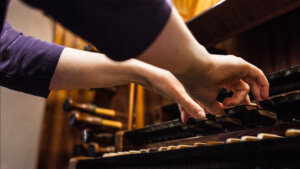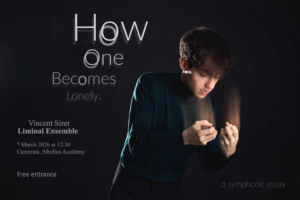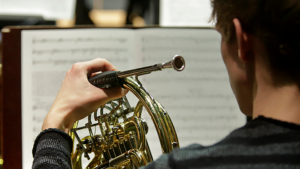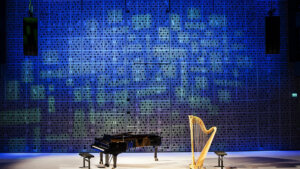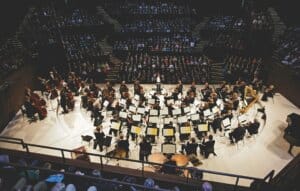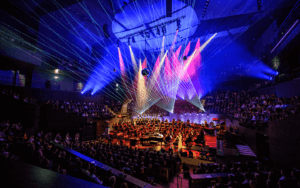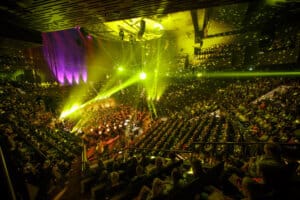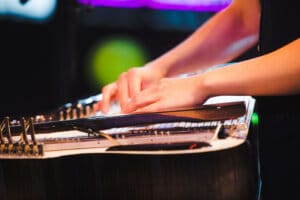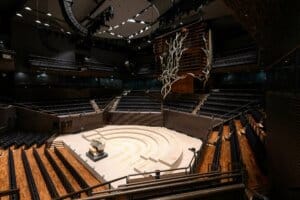
Estimated duration
2 h
Organizer
Radion sinfoniaorkesteri
Fàtima Boix Cantó, artistic planning and clarinet
Yuki Koyama, flute
Annabelle Farid, oboe
Tuukka Vihtkari, bassoon
Jouko Laivuori, piano
Lili Boulanger: D’un Matin de Printemps
Gabriel Pierné: Solo de Concert
Darius Milhaud: Sonata for Flute, Oboe, Clarinet and Piano
Francis Poulenc: Trio for Oboe, Bassoon and Piano
Jean-Michel Damase: Quartet for Flute, Oboe, Clarinet and Piano
Lili Boulanger’s “D’un Matin de Printemps” embodies the post-war optimism of early 20th-century France. Originally composed as a duet for violin and piano in 1917, it captures the essence of a fresh spring morning with delicate melodies and pastoral imagery. Adapted into a trio for violin, cello, and piano the same year, and later for flute and piano, it stands as a testament to Boulanger’s versatility.
Gabriel Pierné’s “Solo de Concert” for bassoon and piano showcases the composer’s virtuosic prowess as both a pianist and a composer. Written in 1935, this piece highlights Pierné’s ability to seamlessly blend intricate technical passages with lyrical beauty, making it a staple in the repertoire for bassoon performance.
Darius Milhaud’s “Sonate for Flute, Oboe, Clarinet, and Piano”, composed in 1918, showcases his groundbreaking experimentation with polytonality and jazz-inspired rhythms, reflecting the vibrant cultural scene of early 20th-century Paris.
Francis Poulenc’s “Trio for Oboe, Bassoon, and Piano” was completed in 1926 and is celebrated for its charming melodies and witty character. Poulenc, known for his unique blend of neoclassical elegance and modern sensibility, infuses this trio with playful interplay between the instruments, creating a delightful listening experience.
Jean-Michel Damase’s “Quartet for Flute, Oboe, Clarinet, and Piano” contributes a modern touch to the program. Composed in 1991, this piece showcases Damase’s distinctive lyrical style and his skill in crafting chamber music. It seamlessly blends elements of classical refinement with innovative modernity, reflecting the musical landscape of late 20th-century France. Damase’s quartet offers a captivating synthesis of traditional chamber music structures with contemporary harmonies and rhythmic complexities, demonstrating his mastery in navigating both classical and modern idioms.
Tickets to Musiikkitalo concerts and other events are available to purchase on our website, by telephone and at our physical box office.
Book tickets for 10–20 or more people is by contacting group sales service by email at ryhmat@musiikkitalo.fi or by telephone on 0600 411 101 (Monday to Friday, 9:00–15:00).
How about a cup of coffee, a bite to eat or a glass of bubbly during the interval? Order your drinks in advance to beat the queues and make the most of your concert visit. Interval refreshments are not available at all concerts.
Our location could not be more central or easier to get to. Almost all forms of Helsinki public transport stop right outside our doors, cycle parking is provided at all our entrances, and Aimo Park Finlandia, our nearest multi-storey car park, offers lift access directly to our main foyer.
At Helsinki Music Centre we are proud to be an accessible and welcoming place for everyone. Tactile handrails and signage have been fitted across the building, and there are tactile indicator strips on the floor too to guide partially sighted and blind visitors. Induction loops are always available, and guide or companion dogs are of course permitted within the building.
Concert Hall
The route to your seat is always printed on your ticket. Check the door number to find out which entrance to take. The seating areas are marked with letters. There is level access to all wheelchair seats from the main entrances. Don’t worry if you’re not familiar with our venue – our staff are always on hand to help you find your seat.
Black Box, Camerata and Sonore
Use the row number printed on your ticket to find your seat. Wheelchair seats are situated on the same level as the entrance. Don’t worry if you’re not familiar with our venue – our staff area always on hand to help you find your seat.
Unallocated seating
Please choose your seat on the day.
Floor plans
You can view our floor plans before your visit.
Cloakroom
We ask you to leave your coat and any larger items in the cloakroom. The cloakroom is free of charge.
Latecomers
Latecomers will be asked to wait until a suitable break in the performance or admitted after the interval.
Photography
You are not permitted to record concert performances at Helsinki Music Centre. However, you may take photographs before and after the concert and during applause. Individual concert organisers may have their own, more detail guidance regarding recording and photography.
Dress code
We’re happy to say we have no dress code at Helsinki Music Centre, and we positively encourage you to come as you are. However, we would be grateful if you could avoid wearing strong perfume during your visit so that people with asthma and fragrance sensitivity can enjoy our concerts symptom free.

